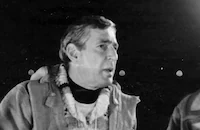Angel Baby

Brief Synopsis
Cast & Crew
Paul Wendkos
Salome Jens
George Hamilton
Mercedes Mccambridge
Joan Blondell
Henry Jones
Film Details
Technical Specs

Synopsis
Shocked into muteness by a brutal father, young Jenny Brooks tries to escape the loneliness of her life by becoming the town trollop. Then one day a faith-healing preacher named Paul Strand comes to the small southern town where Jenny lives and miraculously restores her power of speech. Deeply moved, she abandons her former ways and joins Paul's troop of touring evangelists. The simple honesty of her faith wins her the friendship of the somewhat alcoholic Mollie and Ben Hays, but the soft beauty of her youth arouses the jealousy of Paul's wife, Sarah, an older, twisted, vindictive woman. After accusing Paul of having adulterous thoughts, Sarah "persuades" Jenny to go out on her own, and, accompanied by Mollie and Ben, the young girl--now billed as Angel Baby, The Preacher of the Ages--begins a tour of the South. An unscrupulous drug manufacturer, Sam Wilcox, becomes her manager and uses the innocence of her spiritual fervor to further his own mercenary ends, even resorting to rigging a phony healing in which the unsuspecting Jenny restores a "blind" man's sight. The night after the "miracle," as hundreds of the ill and maimed wait to be cured, Sarah arrives at the tent, denounces Jenny as a fraud, and exposes the bogus miracle. As the stunned Jenny staggers from her platform, the crowd riots, and in the ensuing melee, Sarah is killed. Paul seeks out Jenny and tries to persuade her to return to preaching. At first she refuses, but when her prayers help a crippled child to walk again, she rediscovers her faith and decides to join Paul in the continuance of his evangelical work.

Director

Paul Wendkos
Cast
Salome Jens

George Hamilton

Mercedes Mccambridge

Joan Blondell

Henry Jones

Burt Reynolds
Roger Clark
Dudley Remus
Victoria Adams
Harry Swoger
Barbara G. Biggart
Davy Biladeau
Eddie Firestone
Crew
Irene Aparicio
Henry Beau
Orin Borsten
Stanley Campbell
Sidney Clifford
Hubert Cornfield
Marjorie Corso
Guy Del Russo
Dave Kahn
Leonard Katzman
Richard Kay
Betty J. Lane
Jack Marta
Paul Mason
Gale Mcgarry
Al Overton
Samuel Roeca
Kay Rose
Francis Schwartz
Wayne Shanklin
Wayne Shanklin
Val Tamelin
George Troast
Haskell Wexler
Thomas F. Woods
Thomas F. Woods

Videos
Movie Clip



Hosted Intro
Film Details
Technical Specs

Articles
Angel Baby -
By Frank Miller

Angel Baby -
Mercedes McCambridge (1916-2004)
She was born Charlotte Mercedes McCambridge on March 16, 1916, in Joliet, Illinois. After graduation from Mundelein College in Chicago, she acted in local radio, doing everything from children's programs to soap operas. By the early '40s, she relocated to New York, where her powerful voice kept her busy as one of the top radio actresses of her day, including a stint with Orson Wells' radio dramas.
In the late '40s she appeared successfully in several Broadway productions, and this led a call from Hollywood. In her film debut, she was cast as Broderick Crawford's scheming mistress in All the King's Men (1949) and won an Oscar® for her fine performance.
Despite her strong start, McCambridge's film roles would be very sporadic over the years. Her strengths were her husky voice, square build, and forthright personae, not exactly qualities for an ingenue. Instead, McCambridge took interesting parts in some quirky movies: playing a self-righteous church leader opposite Joan Crawford in one of the cinema's great cult Westerns, Nicholas Ray's kinky Johnny Guitar (1954); a key role as Rock Hudson's sister in George Stevens' epic Giant (1956, a second Oscar® nomination), and as a gang leader in Orson Wells' magnificent noir thriller Touch of Evil (1958).
By the '60s, McCambridge's career was hampered by bouts of alcoholism, and apart for her voice work as the demon in William Friedkin's The Exorcist(1973, where the director cruelly omitted her from the credits before the Screen Actors Guild intervened and demanded that she receive proper recognition), the parts she found toward the end of her career were hardly highpoints. Some fairly forgettable films: Thieves (1977), The Concorde - Airport '79 (1979) and guest roles in some routine television shows such as Charlie's Angels and Cagney & Lacey were all she could find before quietly retiring from the screen.
It should be noted that McCambridge finished her career on a high note, when in the early '90s, Neil Simon asked her to play the role of the grandmother in Lost in Yonkers on Broadway. Her return to the New York stage proved to be a great success, and McCambridge would perform the play for a phenomenal 560 performances. They were no surviving family members at the time of her death.
by Michael T. Toole
Mercedes McCambridge (1916-2004)
Quotes
Trivia
Notes
Location scenes filmed in Florida. Hubert Cornfield, the film's original director, was replaced after a week of filming due to disagreements with the producer; approximately 6 minutes of Cornfield's footage was included in the released film.

Miscellaneous Notes
Released in United States May 12, 1961
Released in United States Spring May 10, 1961
Original director, Hubert Cornfield, was replaced after one week of filming. Six minutes of his footage was included in the film.
Released in United States Spring May 10, 1961
Released in United States May 12, 1961 (Detroit, Michigan)














